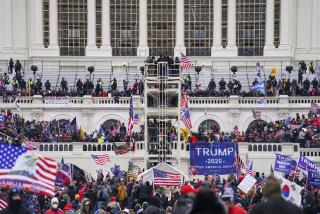U.S. hopes in Bahrain dealt another setback
- Share via
WASHINGTON — Harsh jail terms upheld this week for 13 Bahraini activists marked a setback to the Obama administration’s hope that the Sunni Muslim monarchy was ready to settle its bloody conflict with the country’s restless Shiite majority. It wasn’t the first time Washington has been disappointed.
In the 18 months since the tiny but strategically vital Persian Gulf ally exploded in street protests, the administration has repeatedly pinned its hope on moves by the monarchy that appeared promising but soon fell short.
Washington was encouraged when the government agreed to have civil courts review tough sentences for the activists handed down last year by military tribunals. President Obama himself underscored the high stakes, declaring that “you can’t have meaningful dialogue when parts of the opposition remain in jail.”
But the civil courts this week upheld the original verdicts, which include seven life sentences.
Opposition figures, human rights groups and some U.S. lawmakers complained that the outcome showed that the administration had been fooled by “false dawns” and needed to move to a more forceful approach.
“The Arab world can’t take seriously American claims that it cares about human rights in Syria when it is not doing more in Bahrain,” said Matar Matar, a former legislator with Wefaq, the leading opposition party.
The administration has been increasingly outspoken in its criticism of the monarchy, even while pressing the government and the opposition privately to reach a compromise.
Assistant Secretary of State Michael Posner, the State Department’s point man on human rights, told Congress last month that Bahrain still hadn’t begun a dialogue about reform. He said the monarchy needed to halt excessive use of force by police, to stop prosecutions for political expression and to hold accountable those responsible for past rights abuses. He also faulted some demonstrators for violence.
“Bahrain is still a deeply divided nation,” he told a bipartisan congressional panel, the Tom Lantos Human Rights Commission.
Yet there are limits on how far the administration will push. Bahrain provides a home for the U.S. Navy’s 5th Fleet and is an important partner in efforts to contain nearby Iran. Street demonstrations in Bahrain have taken on a more anti-American cast this year, but the relationship between the two governments is, if anything, closer.
The protests began in mid-February 2011 amid the “Arab Spring” uprisings, driven by demands for reforms that would give a share of political power to predominantly poor Shiites who have long faced discrimination.
Amid a government crackdown, U.S. officials focused on a plan for new talks between government and opposition officials that was called the “national dialogue.” But the conversations made little headway.
The administration praised the monarchy’s commissioning of a November 2011 report that investigated the government’s handling of the demonstrations, concluding that security forces used torture and excessive force. But though the government took steps to improve police training and halt some abuses, some tough tactics continue, and the report stopped short of addressing political reforms.
In May, the administration partially lifted its embargo on arms sales to the kingdom, aiming to strengthen the position of Bahrain’s crown prince, Sheik Salman ibn Hamed Khalifa, who it hoped could become a leader of the pro-reform faction. That hasn’t panned out.
Rep. Jim McGovern (D-Mass.), co-chairman of the Lantos commission, praised the administration’s public statements but called for more forceful action.
“It’s clear that this approach has not worked. … If anything, the situation is deteriorating,” said McGovern. “If there are no consequences for what the government has been doing, people will wonder how committed the U.S. is to democracy and freedom in the Arab world.”
Yet congressional calls for more U.S. pressure on Bahrain have been limited, because many legislators believe ties with Bahrain are essential, especially considering the risk of war with Iran.
There have been signs this year that Shiites are growing more resentful of the U.S. approach. In the protests this spring, demonstrators burned American flags and accused the United States of providing some of the arms used against it.
But U.S. officials, while acknowledging their disappointment, say there are limits on what they can do, beyond the arms sale ban and jawboning.
“This is an issue for the Bahrainis to resolve among themselves,” Posner told the congressional commission Aug. 1. “I think our best role is to be a quiet supportive voice on the outside.”
More to Read
Sign up for Essential California
The most important California stories and recommendations in your inbox every morning.
You may occasionally receive promotional content from the Los Angeles Times.














